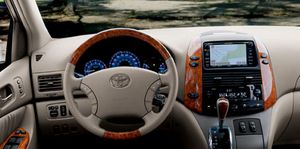.
Toyota Sienna Review
The 2006 Sienna minivan is the gold standard for the family set. The main Toyota attributes of value, practicality, reliability and just enough style not to be boring brings this to the top of the class. The recently redesigned Honda Odyssey is the other van that gets high grades. The Sienna has plenty of room, can carry most of a hockey team and has no significant flaws.
See also the main fact sheets for the Toyota Sienna.
High Points
- Resale value is good
- Well designed
- Easy to drive
- Fits 7-8 very comfortably
Low Points
- Outboard and center removable seats are a bit heavy which make moving them a pain
Performance and Handling
This is where the Sienna shines. This is a big, heavy full size minivan. The engine is strong and the handling is very car-like. The V6 is plenty strong and freeway acceleration is good. Quiet on the inside, other than the kids yelling of course, and nimble on its feet – the Sienna feels like a slightly bigger Camry. While most minivans would not fall into the "fun-to-drive" category – this van scores as high as can be expected on the road. Cornering and stability are excellent at high speeds and overall maneuverability is good. The cruise control works well. There have been reports of excessive tire wear, especially on the all wheel drive version.
Gas Mileage
EPA estimates for the Toyota Sienna are 19/26 MPG for the CE, LE, XLE Front Wheel Drive trims and 17/23 MPG for the LE and XLE All Wheel Drive trims. The fuel tank capacity on all trims of the Sienna is 20 gallons.
Safety
Exactly what you would expect. Side curtain airbags are now standard. A rear view camera is an option and all wheel drive and vehicle stability control are available. Performs very well in government crash tests.
Reliability and Maintenance
- The Toyota Sienna comes with a Basic 36 months/36,000 miles warranty and Powertrain 60 months/60,000 miles warranty.
- Components under the federal emission defect warranty are covered for 36 months/36,000 miles and specified major emission control components are covered for 80 months/80,000 miles.
- In California and any other state that adopts California emission warranty provisions, performance warranty and defect warranty coverage is applicable for 36 months/50,000 miles, and specific control devices are covered for 7 years/70,000 miles.
- Warranty coverage on accessories is 12 months, regardless of mileage.
Interior and Comforts
- The Sienna's driving position is comfortable with outstanding visibility. * The stereo and A/C controls are logical and easy to use.
- The side doors have roll-down windows (though they only roll down 2/3rds of the way).
- The second row has captains chair or the "8 passenger" option which is three independent seats that create a 3 person bench in the second row. Great if you have 6 kids, but extremely cumbersome to get around to get to the back seat. It’s difficult to put these seats in and out and the pop up mechanism to get around them is not great. The third-row seat is the Sienna's best feature. The seat splits in the back and either piece folds into the cargo floor perfectly flat. With the seat up (or partially up), there's excellent storage in the well. Both of the side doors and the tailgate can be power-operated depending on the trim level.
- The side doors move okay manually, the rear door is heavy and cumbersome – the automatic rear door highly recommended.
Exterior
This second-generation Toyota Sienna was designed in California, engineered in Michigan, and is built in Indiana. It was redesigned and launched as a 2004 model, with the wheelbase lengthened five inches and the track widened by four inches over the older, first-generation Sienna, a dramatic change. Measuring 200 inches front to rear, on a 119-inch wheelbase, the Sienna is a big vehicle. There's nothing mini about it.
Overall, with its big headlamps and big taillamps, the Sienna has an imposing presence, especially at night. Black window pillars and extensions on the steeply raked windshield lend a sleek appearance and make it look even larger than it is. Nevertheless, the overall impression of strength is undercut a bit by the proportionally smaller wheels and grille.
A big windshield, big wipers, and wiper-mounted washer nozzles were designed to improve driver visibility in the worst conditions the Snow Belt can dish up. The slot for the sliding doors is cleverly hidden, offering a cleaner look.
Styles and Options

The Sienna offers a wide array of of trim levels (CE, LE, XLE, and Limited) – and a mind-numbing set of variations within trim levels. The list of available options and features is extensive and complicated. Understanding the world of Sienna packages is in the critical path of evaluating which trim is best and can be quite difficult.
Main Competitors
- Honda Odyssey: side-by-side comparison
- Dodge Caravan: side-by-side comparison
- Nissan Quest: side-by-side comparison
- Chrysler Town and Country: side-by-side comparison
External Links
WikiCars Contributor Favorites
Toyota Manufacturer Sites
- Official Toyota Sienna Website - Official US Site
Community Sites
- Toyota Sienna - specs, reviews, prices and pictures.
- Toyota Sienna Review
- SiennaClub.org
